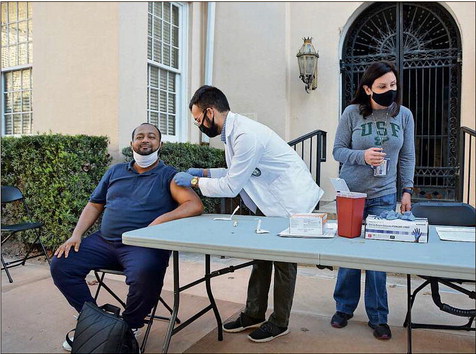A shot in the arm for the most vulnerable
Natalie Weber | Tampa Bay Times
Apr 05, 2021

Chan Heng was attending a flea market in Pinellas Park last week when he saw a booth advertising appointments for the coronavirus vaccine at the Lealman and Asian Neighborhood Family Center.
So the 54-year-old St. Petersburg resident signed up. It was so much easier than trying to do it online, he said.
He was one of about 300 people vaccinated at the center Saturday. It serves the Lealman area and many immigrant residents, like Heng, who moved to the United States from Cambodia in 1982. The staff even translated for patients.
“This is very convenient,” Heng said.
It is one of many clinics across the Tampa Bay region whose mission is getting vaccines to underserved communities. While the state is allowing all residents 16 and older to get vaccinated starting today, some Floridians still face obstacles. Low-income and migrant residents can lack transportation and face language barriers.
Florida’s residency requirement has raised concerns about vaccine access for migrant workers, the undocumented and those experiencing homelessness. Immigration advocates recently called for an end to the requirement, saying it excludes undocumented immigrants, according to the Orlando Sentinel.
The Florida Department of Health says a state-issued ID is needed to receive a vaccine. Seasonal residents may present two forms of identification, such as a deed, mortgage or lease, a utility bill or mail from the government or a bank.
Florida Division of Emergency Management spokeswoman Samantha Bequer said health officials can also accept other proof of residency at their discretion, such as a letter from an employer or landlord, or a spouse’s proof of residency along with proof of marriage.
But for those who struggle with such documents and requirements, a patchwork vaccination effort has sprung up across the Tampa Bay region. Advocacy groups, health departments and vaccination sites started serving communities that otherwise might be excluded.
Redlands Christian Migrant Association health advocate Noe Bautista helped organize a clinic that distributed vaccines to migrant farm workers in Mulberry. The clinic received 400 doses of vaccines including both the first and second doses of Pfizer vaccines. The first round was administered March 20.
“The first barrier is the lack of vaccines,” Bautista said. “They don’t have access.”
The registration and identification process was simple, Bautista said. Organizers asked for workers’ names, date of birth, phone numbers and town where they live. Bautista also helped translate information into Mixtec, the language of the indigenous Mexican farmworkers he works with.
Clearwater’s Hispanic Outreach Center offered the first dose of coronavirus vaccines to community members at the end of February and the second doses were distributed at the end of March. In total, the staff fully vaccinated 244 people. CEO Jaclyn Boland said the next clinic, scheduled for April 10, is almost fully booked.
The center asks participants to bring a photo ID and proof of residency. But Boland said they’re also accepting items such as foreign passports for those who don’t have state-issued identification. For those who do not have their own bills or bank statements, proof of residency from someone they share a home with is acceptable, along with a statement from that person affirming they live together.
“Really, we haven’t found many people having an issue with that part,” Boland said.
Dr. Nichelle Threadgill, chief medical officer at Community Health Centers of Pinellas, Inc., said its clinics have tried to offer flexibility to patients and those who visit pop-up clinics, whose times are listed online. Threadgill said the site accepts any form of identification that the Department of Motor Vehicles would accept. Many patients often share homes with relatives, so proof of residency from someone with whom the patient lives is also acceptable.
“We try not to be restrictive at all,” Threadgill said.
Local groups are also working to ensure vaccine access for those experiencing homelessness across Tampa Bay. As of March 29, the Florida Department of Health in Pinellas County said it had vaccinated 344 patients at local homeless shelters. Homeless Leadership Alliance of Pinellas CEO Amy Foster said local sites serving the homeless have been accepting county blue cards — which give them access to the county health system — as a form of identification.
“We’re excited that eligibility has been expanded and we’ll be able to get more folks vaccinated shortly,” she said.
In Hillsborough County, emergency management has worked with community groups to ensure access for undocumented and homeless residents who might otherwise struggle to get vaccinated. Metropolitan Ministries and Feeding Tampa Bay have also hosted vaccination sites.
Tampa Bay Street Medicine has worked to distribute 93 vaccine doses to its patients, many of whom are experiencing homelessness. Most recently, it distributed the first dose of vaccines to patients at the beginning of March, said clinic co-director Jacob Wasserman.
The organization also administered doses of the Pfizer vaccine in February and 95 percent of patients returned for their second dose, he said.
“I think that the reason for that is the fact that we’ve cultivated a true relationship with our patients over the course of many years,” Wasserman said. “I just took it as a really cool sign.”
Read the full story by Tampa Bay Times at https://tampabaytimes-fl.newsmemory.com/?publink=113c2e5d6
